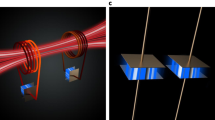Play all audios:

ABSTRACT ALTHOUGH the letters recently published in NATURE on the above theory have indicated that some of the contentions in my article of Jan. 18 last are not generally supported by
scientific opinion, yet some service has perhaps been done by it if only in eliciting the interesting letters from Sir Oliver Lodge, Sir Richard Glazebrook, Prof. Fortescue, Mr. Bedford, and
others. Access through your institution Buy or subscribe This is a preview of subscription content, access via your institution ACCESS OPTIONS Access through your institution Subscribe to
this journal Receive 51 print issues and online access $199.00 per year only $3.90 per issue Learn more Buy this article * Purchase on SpringerLink * Instant access to full article PDF Buy
now Prices may be subject to local taxes which are calculated during checkout ADDITIONAL ACCESS OPTIONS: * Log in * Learn about institutional subscriptions * Read our FAQs * Contact customer
support SIMILAR CONTENT BEING VIEWED BY OTHERS WIRELESS POWER TRANSFER BASED ON NOVEL PHYSICAL CONCEPTS Article 22 October 2021 AN EXPERIMENTALLY VALIDATED FADING MODEL FOR THZ WIRELESS
SYSTEMS Article Open access 21 September 2021 WIRELESS COMMUNICATIONS SENSING AND SECURITY ABOVE 100 GHZ Article Open access 15 February 2023 AUTHOR INFORMATION AUTHORS AND AFFILIATIONS *
Manor Road, Sidmouth AMBROSE FLEMING Authors * AMBROSE FLEMING View author publications You can also search for this author inPubMed Google Scholar RIGHTS AND PERMISSIONS Reprints and
permissions ABOUT THIS ARTICLE CITE THIS ARTICLE FLEMING, A. The ‘Wave Band’ Theory of Wireless Transmission. _Nature_ 125, 307 (1930). https://doi.org/10.1038/125307a0 Download citation *
Issue Date: 01 March 1930 * DOI: https://doi.org/10.1038/125307a0 SHARE THIS ARTICLE Anyone you share the following link with will be able to read this content: Get shareable link Sorry, a
shareable link is not currently available for this article. Copy to clipboard Provided by the Springer Nature SharedIt content-sharing initiative
